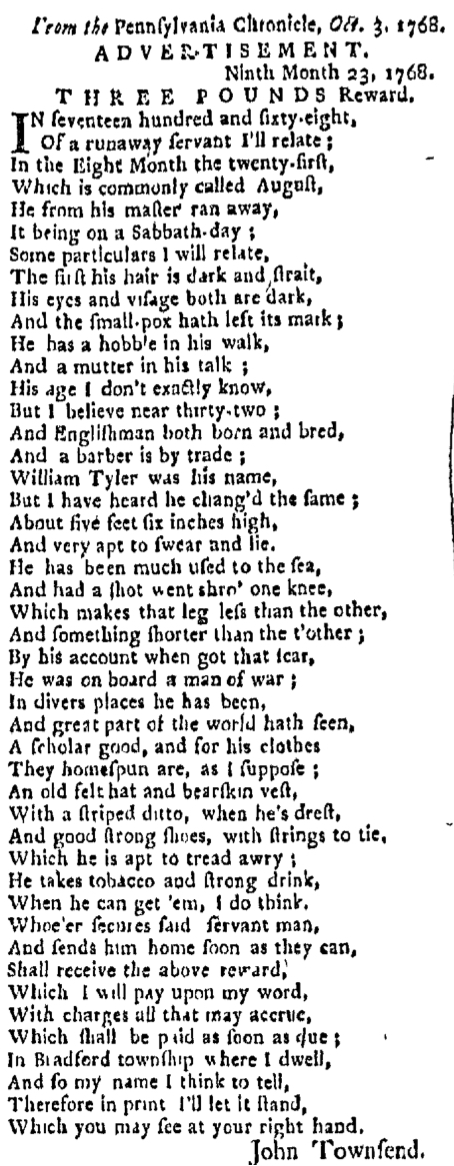What was advertised in a colonial American newspaper 250 years ago today?

“IN seventeen hundred and sixty-eight, / Of a runaway servant I’ll relate.”
A curious advertisement appeared in the October 24, 1768, edition of the Boston Evening-Post. It offered “THREE POUNDS Reward” for the capture and return of William Tyler, an indentured servant who ran away from John Townsend. Yet Townsend had not paid to have this advertisement inserted in the Boston Evening-Post. Instead, the printers, Thomas Fleet and John Fleet, had made an editorial decision to reprint the advertisement as a novelty to entertain their subscribers and other readers. A brief note indicated that they reprinted it from the October 3 issue of the Pennsylvania Chronicle.
The subject of the advertisement was hardly unusual, but the method of delivering the content certainly deviated from that of most other advertisements in colonial newspapers. Rather than writing a brief narrative about the runaway servant, Townsend composed a poem. In nearly two dozen rhyming couplets, he delivered the usual information about Tyler’s age, appearance, occupation, clothing, personality, and other distinguishing characteristics. “He has a hobble in his walk, / And a mutter in his talk,” Townsend reported. Furthermore, the runaway “takes tobacco and strong drink, / When he can get ‘em, I do think.” Many of the rhymes were rather labored, but Townsend managed to insert all the pertinent information. The Fleets apparently considered his efforts worthy of sharing with a larger audience, though likely more for amusement than edification.
Colonial newspapers regularly included items reprinted from other newspapers, some published in the colonies and others in England and other parts of Europe. Modern concepts of plagiarism did not apply; networks of printers exchanged their publications and then borrowed extensively, usually word-for-word, from other newspapers when they compiled news and editorial content for inclusion in their own newspapers. However, they did not usually reprint advertisements. After all, advertisements meant revenues. In most instances printers expected others to pay to have their advertisements inserted in newspapers, but on occasion certain advertisements possessed such entertainment value that printers selected them without concern for collecting fees. In June 1768, for example, the printers of both the New-York Journal and the Providence Gazette inserted an advertisement for a show featuring “HORSEMANSHIP, performed on one, two, and three horses, by Mr. WOLTON.” That advertisement first ran in the London Gazetteer in March 31. Both newspapers acknowledged its origins. The New-York Journal explained that it “is inserted as a Curiosity.”
Advertisements had the capacity to entertain as well to inform or to shape consumer demand. That the Fleets reprinted Townsend’s advertisement that relayed the story of a runaway servant in a poem demonstrates that they perused more than just the news in other publications when identifying content to appropriate and share with their own readers.

Stunning find.
[…] in their newspapers. Yet sometimes printers considered an advertisement so entertaining that they reprinted them as novelties to amuse their […]